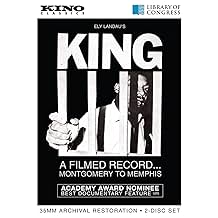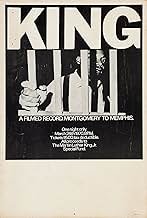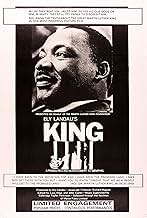King: de Montgomery à Memphis
Original title: King: A Filmed Record... Montgomery to Memphis
- 1969
- 3h 5m
IMDb RATING
8.2/10
684
YOUR RATING
Follows Martin Luther King's life and decades-long civil rights activism.Follows Martin Luther King's life and decades-long civil rights activism.Follows Martin Luther King's life and decades-long civil rights activism.
- Directors
- Writers
- Stars
- Nominated for 1 Oscar
- 1 win & 1 nomination total
Martin Luther King
- Self
- (archive footage)
Ralph Abernathy
- Self
- (archive footage)
James Baldwin
- Self
- (archive footage)
Tony Bennett
- Self
- (archive footage)
Leonard Bernstein
- Self
- (archive footage)
Marlon Brando
- Self
- (archive footage)
H. Rap Brown
- Self
- (archive footage)
- Directors
- Writers
- All cast & crew
- Production, box office & more at IMDbPro
Featured reviews
I'm not sure this is an actual documentary. It has no editorial or narrative structure per se, what it presents us with is as comprehensive a chronology of Dr. Martin Luther King as it is possible to get. From his humble beginnings in an Alabama ridden with bigotry and strife, through to his assassination in 1968, this uses a phenomenal amount of archive research to illustrate the power of his oratory. His speeches are powerful and emotional, but they never come across as angry or provocative of violence. His strength of character and purpose in the face of a long-established racial belligerence is really quite well captured as the film includes the large scale "I Have a Dream" set-pieces to far more intimate and poignant comments to smaller groups, churches or even just to his aides and friends as he travels the length and breadth of the country extolling the virtues of freedom for all. That all isn't just for folks of colour, but those being persecuted for their religious beliefs too, or being disadvantaged because of their sex or social status. It's hard to imagine who might actually watch all of this now, it is a long haul, but it goes quite some way to testifying just how effective oratory can be when delivered confidently and proudly to an audience eager to engage. There is enough annotation to help advise on the locations and timelines, and there are a few - slightly unnecessary, I felt - staged readings from the likes of Charlton Heston and James Earl Jones to help, as does the latter archive footage, demonstrate that his optimism wasn't just inspiring those African Americans, but plenty from the descendants of it's European immigrant population too. It doesn't attempt to analyse the man, his motives or his personal life but I don't think that was anyone's plan. It's a vehicle for his passion, and it works powerfully.
Compiled from newsreel footage and interspersed with celebrity commentary, this film has a heavy impact, showing Rev. King, not as a saint, but as a compassionate man of God with great goals for all people. The film quality is rather rough at times, and the racial slurs shouted are harsh, but the film is powerful. Recommended for those who seek an insight to the man behind the dream.
It's a documentary of Martin Luther King, Jr.'s life from 1955 to his death in 1968. Except for his first speech at the beginning of the Montgomery Bus Boycott, it is primarily news footage and coverage of his best-known activities during those years and the local circumstances that brought about those activities. The Montgomery speech is audio only. That is both its strength and limitation.
This film is one of the few places you can still see and hear the entirety of King's "I Have a Dream" speech of 1963. There are numerous other memorable speeches; seeing him deliver them visually dramatically increases the impact. It is so focused on King, however, that you don't get an overview of the Civil Rights movement, especially those parts in which he had a limited profile, such as the Freedom Rides in 1961.
There is nothing about King's personal life or the work of his associates. To get better context, you need the background of a good biography like Jonathan Eig's "King: a Life." But to be bathed in M. L. King's oratory, this three-hour film is the place to go.
Some celebrities narrate brief segments intermittently. They are a distraction and add nothing.
This film is one of the few places you can still see and hear the entirety of King's "I Have a Dream" speech of 1963. There are numerous other memorable speeches; seeing him deliver them visually dramatically increases the impact. It is so focused on King, however, that you don't get an overview of the Civil Rights movement, especially those parts in which he had a limited profile, such as the Freedom Rides in 1961.
There is nothing about King's personal life or the work of his associates. To get better context, you need the background of a good biography like Jonathan Eig's "King: a Life." But to be bathed in M. L. King's oratory, this three-hour film is the place to go.
Some celebrities narrate brief segments intermittently. They are a distraction and add nothing.
10virek213
If ever there were a documentary that could be deemed absolute required viewing, whether in classrooms or in homes, it is KING: A FILMED RECORD
MONTGOMERY TO MEMPHIS. Shown in only a handful of theaters on one single day (March 24, 1970), and released on video numerous times over the years in condensed form, this monumental documentary, some fourteen years after it was entered into the National Film Registry, is back in release on DVD in the form that people who got to see it in 1970 originally saw it, in its uncut length of just slightly over three hours.
Put together by filmmakers Sidney Lumet and Joseph L. Mankiewicz and producer Ely Landau, KING: A FILMED RECORD looks at the place that the Rev. Dr. Martin Luther King Jr. holds in American history. Having gone from a relatively unknown preacher in the early 1950s to national prominence as a result of Rosa Parks' breaking the segregation barrier on transit buses in Montgomery Alabama, King became one of the great figures of our history by making it his mission in life to see that all men, women, and children in America would be judged by what's in their heart and not by what their skin color was. In the original uncut form that had gotten it an Oscar nomination for Best Documentary Feature in 1970 (it lost to WOODSTOCK), KING: A FILMED RECORD looks at all the important moments in Dr. King's non-violent revolution that would forever change the American landscape, even if it didn't change everybody's perceptions of those different from themselves. He fought non-violently against racist governors like George Wallace, bigoted police chiefs like Birmingham, Alabama's infamous Bill Connor, led the march on Selma, and managed to get long-stalled civil rights and voting rights legislation through Congress onto the books through the signature of then-president Lyndon Johnson . All of his most important speeches are included in their full, unexpurgated form here, including the monumental "I Have A Dream" speech he made during the March on Washington of August 28, 1963, and his final "I've Been To The Mountaintop" speech he made in Memphis on the night of April 3, 1968, the night before he was felled by an assassin's bullet.
We also see how tough the struggle could be, what with the murder of Malcolm X, the formation of militaristic groups like the Black Panthers, the urban rioting, White resistance in the South, and, perhaps most important of all, the war in Vietnam, which would eventually destroy Johnson's achievements as a crusader alongside King for civil rights and also be responsible for sending thousands of poor and working-class young men, white and Negro alike, to their deaths. These are important reminders of where America was during the 1960s, how far it has come since then with the election of our first African-American president in Barack Obama, and how, in many other ways, we still have a long way to go towards full acceptance of difference and diversity in America.
All of this makes KING:A FILMED RECORD an epic film to match any that Hollywood itself ever did, but that is because the real-life story it tells is a true American epic of modern times. Martin Luther King was one of the greatest American citizens who ever lived, and this documentary ensures that his legacy will never be forgotten.
Put together by filmmakers Sidney Lumet and Joseph L. Mankiewicz and producer Ely Landau, KING: A FILMED RECORD looks at the place that the Rev. Dr. Martin Luther King Jr. holds in American history. Having gone from a relatively unknown preacher in the early 1950s to national prominence as a result of Rosa Parks' breaking the segregation barrier on transit buses in Montgomery Alabama, King became one of the great figures of our history by making it his mission in life to see that all men, women, and children in America would be judged by what's in their heart and not by what their skin color was. In the original uncut form that had gotten it an Oscar nomination for Best Documentary Feature in 1970 (it lost to WOODSTOCK), KING: A FILMED RECORD looks at all the important moments in Dr. King's non-violent revolution that would forever change the American landscape, even if it didn't change everybody's perceptions of those different from themselves. He fought non-violently against racist governors like George Wallace, bigoted police chiefs like Birmingham, Alabama's infamous Bill Connor, led the march on Selma, and managed to get long-stalled civil rights and voting rights legislation through Congress onto the books through the signature of then-president Lyndon Johnson . All of his most important speeches are included in their full, unexpurgated form here, including the monumental "I Have A Dream" speech he made during the March on Washington of August 28, 1963, and his final "I've Been To The Mountaintop" speech he made in Memphis on the night of April 3, 1968, the night before he was felled by an assassin's bullet.
We also see how tough the struggle could be, what with the murder of Malcolm X, the formation of militaristic groups like the Black Panthers, the urban rioting, White resistance in the South, and, perhaps most important of all, the war in Vietnam, which would eventually destroy Johnson's achievements as a crusader alongside King for civil rights and also be responsible for sending thousands of poor and working-class young men, white and Negro alike, to their deaths. These are important reminders of where America was during the 1960s, how far it has come since then with the election of our first African-American president in Barack Obama, and how, in many other ways, we still have a long way to go towards full acceptance of difference and diversity in America.
All of this makes KING:A FILMED RECORD an epic film to match any that Hollywood itself ever did, but that is because the real-life story it tells is a true American epic of modern times. Martin Luther King was one of the greatest American citizens who ever lived, and this documentary ensures that his legacy will never be forgotten.
This movie consists almost entirely of documentary news footage of Dr. Martin Luther King, Jr.'s crusade for racial equality from the 1950s up to the time of his assassination in 1968. It features a wide diversity of gripping footage... interviews, sermons, marches, press conferences and speeches by Dr. King as he gradually secured basic rights and dignity for his people (and thereby for ALL people). As we sit here today, with prejudice remaining far too abundant in American society, it is nonetheless hard to believe that so much struggle and sacrifice was needed to secure what our Constitution and laws had already bestowed on all of our citizens long before Dr. King began his heroic effort.
Dr. King's inspiring oratory is a potent contrast to the hatred, bigotry and unrelenting brutality he and his followers faced time and again. Scenes of police violence and jeering white racists are sprinkled liberally throughout the film and are truly horrifying. The patience and nonviolence of the African-American protesters in the face of their oppressors is remarkable.
The film ends with Dr. King's funeral, an event that is foretold by Dr. King himself time and again in this film as he muses about the possibility of his death at the hands of his racist antagonists. In one such prophetic moment contained in the movie, Dr. King says:
"You know when I say 'Don't be afraid', you know what I really mean - don't even be afraid to die! But I submit to you tonight, no man is free if he fears death. But the minute you conquer the fear of death, at that moment, you are free. You must say, somehow, 'I don't have much money - I don't have much education - I may not able to be able to read or write - but I have the capacity to die!'"
The DVD is available from the distributor, Kino Lorber... don't even hesitate to buy it. This is a must-see film for anyone even remotely concerned about social justice or history.
Dr. King's inspiring oratory is a potent contrast to the hatred, bigotry and unrelenting brutality he and his followers faced time and again. Scenes of police violence and jeering white racists are sprinkled liberally throughout the film and are truly horrifying. The patience and nonviolence of the African-American protesters in the face of their oppressors is remarkable.
The film ends with Dr. King's funeral, an event that is foretold by Dr. King himself time and again in this film as he muses about the possibility of his death at the hands of his racist antagonists. In one such prophetic moment contained in the movie, Dr. King says:
"You know when I say 'Don't be afraid', you know what I really mean - don't even be afraid to die! But I submit to you tonight, no man is free if he fears death. But the minute you conquer the fear of death, at that moment, you are free. You must say, somehow, 'I don't have much money - I don't have much education - I may not able to be able to read or write - but I have the capacity to die!'"
The DVD is available from the distributor, Kino Lorber... don't even hesitate to buy it. This is a must-see film for anyone even remotely concerned about social justice or history.
Did you know
- TriviaThis film originally was shown at theaters as a "one-time-only" event on 24 March 1970 and ran 3 hours and 5 minutes. The proceeds from the $5 admission price were donated to the Dr. Martin Luther King Jr. Special Fund. It was later shown on US television, unedited and with limited interruption.
- Alternate versionsA second version, edited down to 103 minutes, was released onto videotape. It is missing the celebrety narratives and an opening montage of clips of militant black leaders with violent rhetoric contrasting to clips of Dr. King's non-violent messages, but includes the original introduction by Harry Belefonte, and consists entirely of newsreel footage.
- ConnectionsFeatured in C'est assez noir pour vous?!? (2022)
Details
- Release date
- Country of origin
- Language
- Also known as
- King: A Filmed Record... Montgomery to Memphis
- Filming locations
- Production company
- See more company credits at IMDbPro
- Runtime
- 3h 5m(185 min)
- Color
- Sound mix
- Aspect ratio
- 1.37 : 1
Contribute to this page
Suggest an edit or add missing content








































